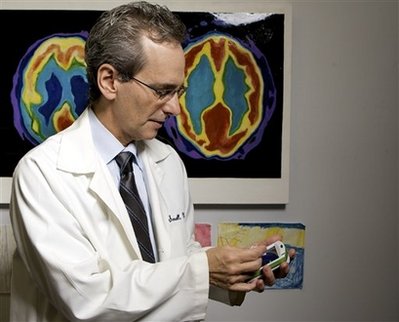数字化时代,我们的大脑成熟更快还是更慢?虚拟世界在如何改变我们的大脑?
AP – University of California, Los Angeles, Professor of Psychiatry Dr. Gary Small plays with a digital memory …
Scientists ask: Is technology rewiring our brains?
By MALCOLM RITTER, AP Science Writer Malcolm Ritter, Ap Science Writer – Wed Dec 3, 5:07 pm ET
NEW YORK – What does a teenage brain on Google look like? Do all those hours spent online rewire (重新布线) the circuitry (电路系统)? Could these kids even relate better to emoticons than to real people? These sound like concerns from worried parents. But they're coming from brain scientists.
While violent video games have gotten a lot of public attention, some current concerns go well beyond that. Some scientists think the wired world may be changing the way we read, learn and interact with each other.
There are no firm answers yet. But Dr. Gary Small, a psychiatrist (精神病医师, 精神病学家) at UCLA [ (美国)加利福尼亚大学洛杉矶分校], argues that daily exposure to digital technologies such as the Internet and smart phones can alter how the brain works.
When the brain spends more time on technology-related tasks and less time exposed to other people, it drifts away from fundamental social skills like reading facial expressions during conversation, Small asserts.
So brain circuits involved in face-to-face contact can become weaker, he suggests. That may lead to social awkwardness, an inability to interpret nonverbal messages, isolation and less interest in traditional classroom learning.
Small says the effect is strongest in so-called digital natives — people in their teens and 20s who have been "digitally hard-wired since toddlerhood (toddler 初学走路的孩子)." He thinks it's important to help the digital natives improve their social skills and older people — digital immigrants — improve their technology skills.
At least one 19-year-old Internet enthusiast gives Small's idea a mixed review. John Rowe, who lives near Pasadena, Calif., spends six to 12 hours online a day. He flits (飞快地转换) from instant messaging his friends to games like Cyber Nations and Galaxies Ablaze to online forums for game players and disc jockeys (DJ).
Social skills? Rowe figures (考虑) he and his buddies are doing just fine in that department, thank you. But he thinks Small may have a point about some other people he knows.
"If I didn't actively go out and try to spend time with friends, I wouldn't have the social skills that I do," said Rowe, who reckons (估计) he spends three or four nights a week out with his pals. "You can't just give up on having normal friends that you see on a day-to-day basis."
More than 2,000 years ago, Socrates [苏格拉底(469-399BC,古希腊哲学家)] warned about a different information revolution — the rise of the written word, which he considered a more superficial way of learning than the oral tradition. More recently, the arrival of television sparked concerns that it would make children more violent or passive and interfere with their education.
Small, who describes his modern-day concerns in a new book called "iBrain: Surviving the Technological Alteration of the Modern Mind," acknowledges he doesn't have an open-and-shut case that digital technology is changing brain circuitry.
Still, his argument is "pretty interesting and certainly provocative (煽动的)," although difficult to prove, says brain scientist Tracey Shors of Rutgers University.
Others are skeptical (怀疑的). Robert Kurzban, a University of Pennsylvania psychologist, said scientists still have a lot to learn about how a person's experiences affect the way the brain is wired to deal with social interaction.
Life in the age of Google may even change how we read.
Normally, as a child learns to read, the brain builds pathways (通道) that gradually allow for more sophisticated analysis and comprehension, says Maryanne Wolf of Tufts University, author of "Proust and the Squid: The Story and Science of the Reading Brain."
She calls that analysis and comprehension "deep reading." But that takes time, even if it's just a fraction of a second, and today's wired world is all about speed, gathering a lot of superficial information fast.
Wolf asks what will happen as young children do more and more early reading online. Will their brains respond by short-circuiting parts of the normal reading pathways that lead to deeper reading but which also take more time? And will that harm their ability to reflect on what they've read?
Those questions deserve to be studied, Wolf says. She thinks kids will need instruction tailored (为某一特定目的或目标而制做、修改或调整) to gaining reading comprehension in the digital world.
Some research suggests the brain actually benefits from Internet use.
A large study led by Mizuko Ito of the University of California, Irvine, recently concluded that by hanging out online with friends — sending instant messages, for example — teens learn valuable skills they'll need to use at work and socially in the digital age. That includes lessons about issues like online privacy and what's appropriate to post and communicate on the internet, Ito said.
Rowe, the 19-year-old, said he and his buddies (<美口>密友, 伙伴) often debate whether technology might actually be bad for you. That includes kicking around the argument that computer use makes people socially inept.
Of course, he added, "we spend a lot of time on the computer and still have totally normal and perfect social lives."


